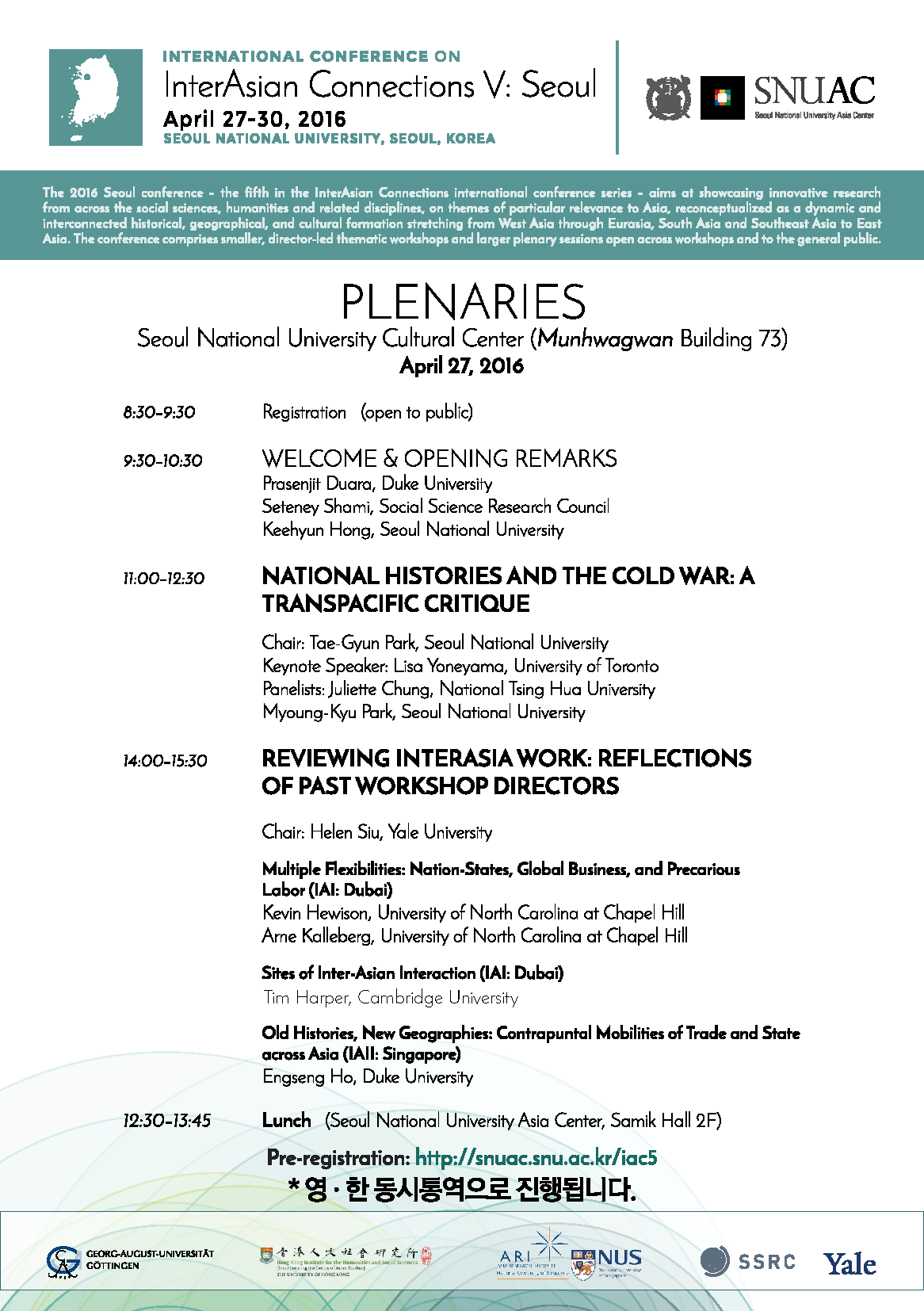참석자
Lisa Yoneyama
University of Toronto
InterAsian Connections V: Seoul Conference
Keynote Speech
National Histories and the Cold War: A Transpacific Critique
냉전과 국민국가의 역사: 범태평양적 관점에서의 비평
Lisa Yoneyama (University of Toronto)
- 일시: 2016년 4월 27일 (수요일) 11:00-12:30
- 장소: 서울대학교 문화관 중강당 (73동)
- 사전등록: http://snuac.snu.ac.kr/iac5
- 영한 동시통역으로 진행됩니다.
서울대학교 아시아연구소는 InterAsian Connections V: Seoul 국제회의의 기조연설자로 캐나다 토론토대학의 Lisa Yoneyama 교수를 초청하여, “냉전과 국민국가의 역사”라는 주제의 발표를 진행합니다. Lisa Yoneyama 교수의 발표에 이어서는, 대만국립청화대의 Juliette Chung 교수와 서울대학교의 박명규 교수의 지정토론이 진행됩니다. Lisa Yoneyama 교수는 동아시아의 여러 국민국가에서 나타나는 역사 해석을 둘러싼 문제들을 국가 내부의 퇴행적 정치의 문제로 보는 시각을 지양해야 한다는 주장을 지속해 왔습니다. 이번 발표는 최근 역사교과서 분쟁, 민족주의적 수정주의, 위안부 문제 등을 둘러싸고 동아시아 사회가 직면하고 있는 사회적 갈등과 관련하여 중요한 시사점을 제시할 수 있을 것입니다. 여러분의 많은 관심과 참여를 부탁드립니다.
Abstract:
In observing the diverse local efforts to bring justice to the victims of Japanese military and colonial violence in the United States, Asia, and the Pacific Islands, Yoneyama has argued for some time that the cultural practices of redress and reparations especially intensifying since the1990s must be seen as a trace of failed post-World War II transitional justice under the Cold War. Not only did it leave many colonial legacies intact, the primarily U.S.-led midcentury administering of justice in Asia-Pacific has rendered certain violences illegible, hence unredressable. In this paper, Yoneyama will argue that the National Historyquestion—most recently manifested as the textbook controversies, nationalist revisionisms,the state interventions, as well as the wartime “military comfort women” issue—also needs to be understood geohistorically in relation to this earlier moment. Much more than a clash between different nationalisms or a problem of sensationalist reactionary politics, the paper hopes to show that, once read conjunctively across the seemingly discrepant national, gendered, racialized, (neo)colonial, and other contexts, the National History question can elucidate the disavowed history of violence, complicity, and other problematic legacies of transpacific Cold War formations, while gesturing toward new possibilities of transborder alliances and justice beyond judicialization.
Lisa Yoneyama received her B.A. in German Language Studies, M.A. in International Relations, both at Sophia University, and Ph.D. in Cultural Anthropology at Stanford University. Her research has focused on the memory politics of war and colonialism, studies of gender and militarism, transnationalism, nuclearism, and the transpacific Cold War and post-Cold War U.S.-Asia relations. From 1992 through 2011 Yoneyama was affiliated with the Literature Department, University of California, San Diego where she taught cultural studies, critical gender studies, and Asian and Asian American studies. She also directed the Program for Japanese Studies (interim, 2008-09) and Critical Gender Studies Program (2009-2011). In 2011 Yoneyama moved to University of Toronto where she teaches for the Women & Gender Studies Institute, Department of East Asian Studies, and Centre for the Study of the United States. Yoneyama’s book publications include: Hiroshima Traces: Time, Space and the Dialectics of Memory (University of California, 1999), a co-edited volume, Perilous Memories: Asia-Pacific War(s) (Duke University Press, 2001), and Violence, War, Redress: Politics of Multiculturalism (Iwanami Shoten, 2003). Yoneyama’s keynote lecture, “National Histories and the Cold War: A Transpacific Critique,” will be based on her forthcoming book, Cold War Ruins: Transpacific Critique of American Justice and Japanese War Crimes (Duke University Press, 2016) but focusing on the question of historical revisionism and (trans)nationalism.
문의사항은 서울대학교 아시아연구소 (02-880-2868, snuac@snu.ac.kr)로 언제든 연락주시기 바랍니다.
Review
아시아연구소와 Social Science Research Council(SSRC), 그리고 해외 유수의 대학 및 아시아전문 연구기관들(University of Göttingen, University of Hong Kong, Asia Research Institute, National University of Singapore, Yale University)이 협력하여 개최한 ‘InterAsian Connections V: Seoul(2016)은 두바이(2008), 싱가포르(2010), 홍콩(2012), 이스탄불(2013)에 이어 아시아연구소에서 다섯 번째로 지난 4월 27일부터 30일까지 열렸다. IAC 국제회의는 해외 유수의 학자들이 연구 어젠다를 나누고 아시아의 과거, 현재, 미래에 대한 새로운 연구 패러다임을 함께 발전시키는 장으로서의 역할을 수행하고 있다.
이번 IAC 서울회의는 크게 두 부분으로 구성되었다. 4월 27일에 열린 전체 세션(Plenary Session)은 IAC에 관심을 가진 일반인들이 참여할 수 있도록 공개 세션으로 진행되었다. 또 이 전체 세션은 SSRC 측에서 조직하는 IAC Alumni 세션과 아시아연구소가 조직하는 로컬 세션으로 이루어졌다. 로컬 세션의 기조연설은 토론토대학의 Lisa Yoneyama 교수가 ‘National Histories and the Cold War: A Transpacific Critique’라는 주제로 발표하였다. 패널리스트로는 대만 국립칭화대의 Juliette Chung 교수와 서울대 사회학과 교수 겸 통일평화연구소장인 박명규 교수가 참여하였다.
Yoneyama 교수는 최근의 역사교과서 분쟁, 민족주의적 수정주의, 국가개입주의, 위안부 문제 등을 통해 나타나는 민족국가들의 역사문제들을 언급하면서, 이 문제들을 이행기 정의확립의 실패와 관련하여 지리적-역사적 맥락에서 이해해야 한다고 주장했다.
주제별 워크숍은 총 10개의 아래 주제로 4월 27일부터 30일까지 5차례에 걸쳐 개별적으로 진행되었다.
- Conviviality beyond the Urban Center: Theorizing the ‘Marginal Hub’
- Force Migration in/of Asia: Connections, Convergences, Comparisons
- Frontier Assemblages: Political Economies of Margins and Resource Frontiers in Asia
- Genealogies of Financialization: Reframing Sovereignty in Asia (1600~present)
- Geo-political Economies of (Post) Developmental Urbanization in East Asia
- Knowledge Mobilities and the Prospects for InterAsian Urbanization
- Logistics of Asia-Led Globalization: Infrastructure, Software, Labor
- Mecca InterAsia
- Mediated Populism across Asia
- The Social Economy and Alternative Development Models in Asia
학술적 모임 외에도 참여자들은 행사 내내 교류의 기회를 가졌는데, 특히 28일 저녁에는 서울대 교수회관에서 모든 행사 참여자가 함께하는 시간을 가졌다. 그룹 디너에는 재즈밴드를 초청하여 분위기를 살렸고, 참여자들은 학술토론의 시간을 넘어 즐거운 모습으로 함께하는 시간을 가졌다.
마지막 날에는 지난 3일간 개별 워크숍 세션들에서 발전시킨 내용을 모든 참여자와 함께 나누는 Directors’ Plenary 세션이 이어졌다. 이 세션은 각 워크숍의 디렉터들이 워크숍의 내용 및 진행사항을 정리, 발표하는 형식으로 진행되었다. 이후 University of Göttingen의 Srirupa Roy와 아시아연구소 강명구 소장의 폐회사로 행사는 성공적으로 마무리되었다.
이번 IAC 서울회의는 아시아연구소가 개최한 행사 중 최대 규모로, SSRC, 해외 유수 대학, 아시아 연구기관들과의 협력확대를 통해 서울대 아시아연구소가 세계 아시아연구의 한 축으로 성장해갈 수 있는 계기가 될 것으로 기대된다.
* InterAsian Connections V: Seoul 회의: http://snuac.snu.ac.kr/?u_event=18053
* 키노트 스피치:
http://snuac.snu.ac.kr/?u_event=interasian-connections-v-seoul-conference-keynote-speech
* 발표문 요약 및 프로그램 다운로드: https://s3.amazonaws.com/ssrc-cdn2/iav-program-web-5717f97de0035.pdf
글 | 김현민(국제교류 코디네이터)







